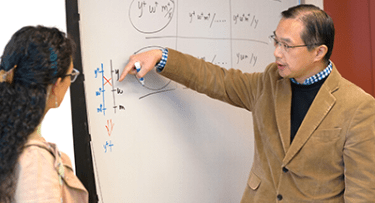
Mathematical Modeling at Mercy College (M3C) – a four-week summer program for high school students – won a Tensor-SUMMA grant from the Mathematical Association of America (MAA). The $5,855 grant will enable M3C to provide lunch for this year’s 20 participants and organize a culminating celebration.
Program Director and Mercy mathematics professor Dr. Nagaraj Rao started M3C in 1994 to help respond to the question he heard all too often from students: “Why do I have to study math? I’ll never use it.” The program teaches mathematical modeling to high-ability high school students from minority backgrounds through a variety of real-world problems and applications, ultimately aiming to inspire them to study and pursue careers in Science, Technology, Engineering and Mathematics (STEM) fields. The program is part of a larger Mercy effort called Access, Collaboration, and Engagement in STEM (ACES), which aims to increase the number of Mercy undergraduates from minority backgrounds who enroll in STEM degree programs and persist to graduation.
With an emphasis on experiential learning like Mercy’s postsecondary programs, M3C centers on real-world applications of math and science such as deducing how hot coffee cools to room temperature and determining the appropriate dosages of medications. In the culminating project, students work in groups to analyze real-world problems such as an actual murder case in which the murderer escaped by jumping out a second-floor window. Students create mathematical models using differential equations by identifying all the relevant variables – which in the murder case included factors such as the murderer’s weight, the distance from the window to the ground, the ground’s characteristics and the force with which they hit the ground – and then solving the problem. Rao explained that some groups get so excited about the final project that they work on it at night and on weekends; one recent group even contacted a doctor and included his insights in their analysis. Groups present at the culminating banquet for their families and a panel of judges, and can win awards for their work.
Speakers and field trips give students additional insight into the real-life work of scientists and mathematicians. In last year’s M3C session, for example, speakers included a music professor who discussed random numbers that generate music and a scientist from the Bronx Zoo who shared research on African elephants. Students also take regular trips to visit professionals and companies working in STEM fields. Last year, for example, students toured the genetic research labs at biotechnology company Regeneron Pharmaceuticals. They also met with scientists at IBM who explained how they designed the famous computer system Watson, which can answer questions posed in natural language – technology that is now used in multiple real-world applications including advising doctors and nurses at Memorial Sloan Kettering Cancer Center on potential treatment options, helping customers find the perfect jacket from outdoor gear company The North Face and automatically generating video highlight reels from Wimbledon tennis matches. Students even had the opportunity to compete against Watson on the visit.
In line with Mercy’s mission to make education more accessible and affordable, Rao attempts to remove any barriers that might prevent high school students from being able to attend M3C. He recognizes, for example, that some participants come from low-income backgrounds and may forgo summer employment to attend M3C. Grant funding from the MAA and the United States Department of Education – which is the primary funder of the program – enables M3C to provide each student with a $500 total stipend, daily lunches and a graphing calculator.
Students participating in M3C never have to ask, “Why do I have to study math?” The program makes it clear that there are all kinds of exciting opportunities to study and work in STEM fields.
At the end of last year’s session, students reported that they were much more likely to apply to a four-year college and take an unrequired science course after participating in M3C. They also reported that it was relatively easy to imagine themselves as future mathematicians or scientists. Mission accomplished.
